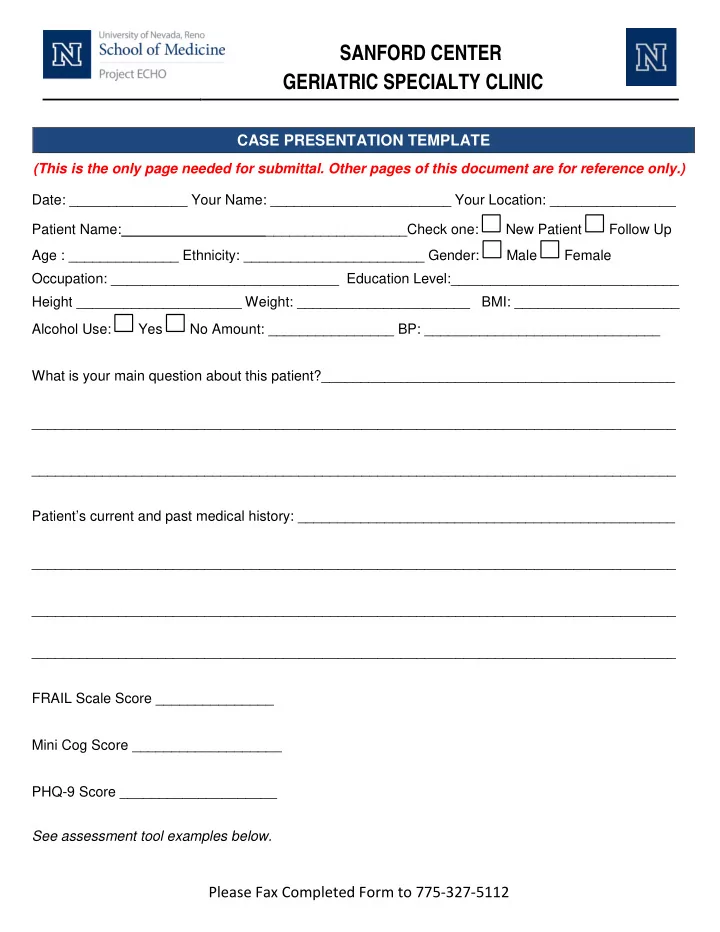

. SANFORD CENTER GERIATRIC SPECIALTY CLINIC CASE PRESENTATION TEMPLATE (This is the only page needed for submittal. Other pages of this document are for reference only.) Date: _______________ Your Name: _______________________ Your Location: ________________ Patient Name: __________________Check one: New Patient Follow Up Age : ______________ Ethnicity: _______________________ Gender: Male Female Occupation: _____________________________ Education Level:_____________________________ Height _____________________ Weight: ______________________ BMI: _____________________ Alcohol Use: Yes No Amount: ________________ BP: ______________________________ What is your main question about this patient?_____________________________________________ __________________________________________________________________________________ __________________________________________________________________________________ Patient’s current and past medical history: ________________________________________________ __________________________________________________________________________________ __________________________________________________________________________________ __________________________________________________________________________________ FRAIL Scale Score _______________ Mini Cog Score ___________________ PHQ-9 Score ____________________ See assessment tool examples below. Please Fax Completed Form to 775-327-5112 .
. ASSESSMENT TOOLS (For reference only – not required for case submittal) FRAIL Scale F atigue R esistance (ability to climb one flight of stairs) A mbulation (ability to walk one block) I llness (Greater than 5) zyxwvutsrqponmlkjihgfedcbaZYXWVUTSRQPONMLKJIHGFEDCBA L oss of Weight (>5%) Scoring: 0= Robust 1-2= Pre-frail > 3 = Frail zyxwvutsrqponmlkjihgfedcbaZYXWVUTSRQPONMLKJIHGFEDCBA __________________________________________________________________________________ The Mini Cog Administration 1. Instruct the patient to listen carefully to and remember three unrelated words and then to repeat the words. 2. Instruct the patient to draw the face of a clock, either on a blank sheet of paper or on a sheet with the clock circle already drawn on the page. After the patient puts the numbers on the clock face, as him/her to draw the hands of the clock to read a specific time. (CDT) 3. Ask the patient to repeat the three previously stated words. Scoring Give 1 point for each recalled word after the CDT distractor. Patients recalling none of the three words are classified as demented (Score = 0) Patients recalling all three words are classified as non-demented (Score = 3) Patients with intermediate word recall of 1-2 words are classified based on the CDT (Abnormal = demented; Normal = non-demented) Note: The CDT is considered normal if all the numbers are present in the correct sequence and position; and the hands readably display the requested time. _________________________________________________________________________________ Please Fax Completed Form to 775-327-5112 2 .
. Patient Health Questionnaire – 9 (PHQ-9) Patient Questionnaire Over the last 2 weeks, how often have you been bothered More Nearly by any of the following problems (circle your answer): Several than half every Not at all days the days day 1. Little interest in doing things 0 1 2 3 2. Feeling down, depressed or hopeless 0 1 2 3 3. Trouble falling or staying asleep, or sleeping too much 0 1 2 3 4. Feeling tired or having little energy 0 1 2 3 5. Poor appetite or overeating 0 1 2 3 6. Feeling bad about yourself – or that you are a failure 0 1 2 3 or have let yourself or your family down 7. Trouble concentrating on things, such as reading the 0 1 2 3 newspaper or watching television 0 1 2 3 8. Moving or speaking so slowly that other people could have noticed? Or the opposite – being so fidgety or restless that you have been moving around a lot more than usual 0 1 2 3 9. Thoughts that you would be better off dead or hurting yourself in some way __________________________________ ___0___ + _______ + _______+ _______ For office coding = Total Score ___________ If you checked off any problems, how difficult have these problems made it for you to do your work, take care of things at home, or get along with other people? Not difficult Somewhat Very Extremely at all difficult difficult difficult Please Fax Completed Form to 775-327-5112 3 .
. Administration For initial diagnosis: 1. Patient completes PHQ-9 Quick Depression Assessment. 2. If patient has selected at least 4 answers in the two right columns (including Questions 1 and 2), consider a depressive disorder. Add score to determine severity. 3. Consider Major Depressive Disorder a. If patient has selected at least 5 answers in the two right columns (one of which corresponds to Question 1 or 2) 4. Consider Other Depressive Disorder a. If patient has selected 2 to 4 answers in the two right columns (one of which corresponds to Question 1 or 2) Note: Since the questionnaire relies on patient self-report, all responses should be verified by the clinician, and a definitive diagnosis is made on clinical grounds, taking into account how well the patient understood the questionnaire, as well as other relevant information from the patient. Diagnoses of Major Depressive Disorder or Other Depressive Disorder also require impairment of social, occupational, or other important areas of functioning and ruling out normal bereavement, a history of a Manic Episode (Bipolar Disorder), and a physician disorder, medication, or other drug as the biological cause of the depressive symptoms. To monitor severity over time for newly-diagnosed patients or patients in current treatment for depression: 1. Patients may complete questionnaires at baseline at a regular intervals (eg, every 2 weeks) at home and bring them in at their next appointment for scoring, or they may complete the questionnaire during each scheduled appointment. 2. Add up circled answers by column. 3. Add together column scores to get a TOTAL score. 4. Refer to PHQ-9 Scoring Card to interpret the TOTAL score. 5. Results may be included in patient’s file to assist you in setting up a treatment goal, determining degree of response, as well as guiding treatment intervention. PHQ-9 Scoring Card for Severity Determination Scoring – add up all the circled numbers on the PHQ-9 Total Score Depression Severity 1-4 None 5-9 Mild 10-14 Moderate 15-19 Moderately Severe 20-27 Severe FAX COMPLETED FORM TO (775) 327-5112 Contact Person: Troy Jorgensen , Program Coordinator, (775) 682-84 81 or tjorgensen @med.unr.edu Project ECHO Main Office: (775) 682-7740 | http://med.unr.edu/echo Please Fax Completed Form to 775-327-5112 4 .
Recommend
More recommend